Introduction
This chapter spells out the nature of the low-carbon, climate-resilient economic opportunity in greater detail. It illustrates how the GLOW projects provide evidence for and pilot-test the creation of decent 1 low-carbon, climate-resilient jobs for women in 17 countries across the Global South. The projects are using this evidence to leverage broader changes in policies and practices.
Improved agricultural productivity for women farmers
Bolivia
The antiplano is the high Andean plateau located mainly in Bolivia and partly in Peru and Chile. In Bolivia’s antiplano, Indigenous communities live in harsh climatic conditions and eke out livelihoods from farming, principally by growing quinoa.
Despite communities’ hopes that quinoa cultivation could provide secure jobs in balance with the local ecology, it has not done so. In recent years, communities have experienced more adverse and intense weather events in a changing climate, compounded by economic pressures and the Covid-19 pandemic. All these shocks have increased households’ vulnerability and diminished their resilience.
Bolivia’s Constitution (2009) has decent jobs as one of the country’s principal development goals.2 The Constitution also promotes social and gender equality and forbids discrimination.3 Nevertheless, data from 2019 shows that 91% of agricultural employment is economically vulnerable 4 because it is own-account work or unpaid family work on the farm. Women, especially Indigenous women, have the worst rates of employment vulnerability.
- The opportunity is to create ways for Indigenous women quinoa farmers to adopt climate-smart practices and stabilise their incomes in the face of climate change.
- GLOW project Creating indigenous women’s green jobs under low-carbon Covid-19 response and recovery is piloting ways for Indigenous women quinoa farmers to make their livelihoods more secure. The project has estimated the carbon and water footprints of quinoa farming in several locations in the antiplano. The communities and researchers are introducing water and energy-saving measures to enhance the sustainability of farming practices and reduce farmers’ vulnerability to climate shocks.
Cameroon
Cameroon has committed to restoring 12 million hectares of degraded lands as part of the African Forest Landscape Restoration Initiative (AFR100). Land becomes degraded when it is unsustainably logged or cleared, diminishing soil fertility, as well as its carbon stores and biological richness. The best way to restore land depends on the location because Cameroon is a vast country with varying microclimates and soil and vegetation types. Planting appropriate tree species and managing trees, crops and livestock sustainably to revitalise soils and watercourses is central to the task – and all in the context of eradicating poverty.
Rural women are key to these efforts, because of the key role they play in agriculture, food security and tree and land management. However, their participation in land restoration is held back by sociocultural and institutional factors. Giving technical support and supplies to rural women’s associations, often via NGOs, can provide important incentives for women to take part.
- The opportunity is to enable more rural women and minority groups to lead land restoration initiatives and tree-based businesses in Cameroon. This should enable them to improve their financial security and food and nutritional security.
- GLOW project Land restoration for post-Covid rural and indigenous women’s empowerment and poverty reduction in Cameroon is working to strengthen government policies and business practices in order to foster women’s and minority groups’ leadership and participation and benefit from land restoration initiatives.
Senegal and Guinea
Both the Senegal and Guinea governments are relying on renewable energy – a mix of solar, hydro and wind power – to underpin their green energy transition and meet their nations’ needs for more energy.
The horticulture sector is an essential source of jobs for women in both countries and is growing rapidly. Horticulture generates 16% and 5% of GDP in Senegal and Guinea, respectively, and it increased production by 37% from 2012-2018. Women are very present in horticultural value chains, from production to marketing and processing. However, certain activities, notably irrigation to grow the plants, require a great deal of growers’ time, as well as financial investment. Irrigation work can also be tedious, especially in small farms that rely on manual irrigation.
- The opportunity is to give women more access to solar energy for irrigation in horticulture, which would alleviate their workload and permit them more leisure time or time for further income-generating activities.
- GLOW project Energy transition for the economic empowerment of women through the horticultural value chain in a post-Covid context in Guinea and Senegal is providing evidence for the benefits of women’s access to and control of solar-powered irrigation systems. This evidence will inform policy decisions for establishing a regulatory framework and public policies to support the large-scale adoption of such systems.
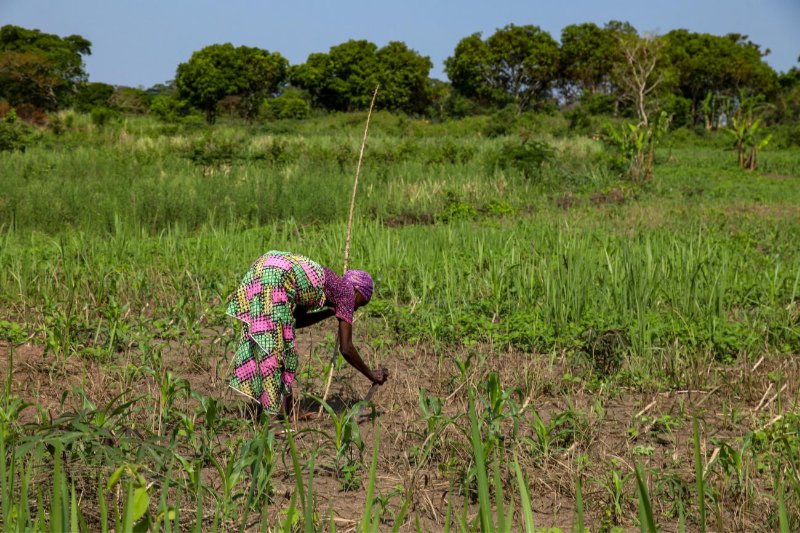
Land restoration in Cameroon (c) CIFOR-ICRAF
Women’s leadership in agricultural value chains
Central America
Many international manufacturers and retailers source agricultural produce and processed foods from the Central American countries of El Salvador, Guatemala and Nicaragua.
However, these value chains are not yet well-managed for climate change adaptation and mitigation: the countries are highly vulnerable to climate change impacts, and their greenhouse gas credentials could be much enhanced.
Business leaders lack knowledge of gender gaps across the agricultural value chains and how to create new, decent jobs for women in the sector.
- The opportunity is to better integrate women workers into the agricultural value chains of large corporations with well-paying, secure work while also ‘greening’ the chains. Such a two-pronged strategy could significantly increase women’s incomes, create jobs resilient to climate impacts and accelerate low-carbon transitions.
- The GLOW project Empowering women in agricultural value chains for a low-carbon transition in Central America is developing recommendations for how agri-businesses in El Salvador, Guatemala and Nicaragua can reduce the carbon and water footprints of their tomato and cocoa value chains. It can also enhance women’s economic opportunities, including by improving their carbon and water management skills.
Malawi
In Malawi, most people live in rural areas. Almost two-thirds of cultivated land is taken up with small-scale maize farming. Smallholder farmers use few agricultural inputs and rely on rainwater. Their yields are low and they are trapped in chronic poverty and food insecurity. Tobacco has long been Malawi’s dominant cash crop. However, global demand for tobacco is declining. The government is seeking to restructure the economy into alternative cash crops that can enhance rural livelihoods and generate exports.
Climate change also challenges farming livelihoods – in the form of slow-onset changes, such as erratic rainfall and extreme weather, including frequent storms. Combined with the Covid-19 pandemic, these factors pushed farming households further into poverty. Women are especially affected because of local gender norms and barriers.
Malawi’s domestic and export markets are growing for improved fruit products, including processed mango fruit and macadamia nuts. The fruit and nut trees thrive in agroforestry systems – ‘trees on farms’. These systems can be managed to enrich soils and sequester carbon. They also offer farmers some protection against the impact of climate change, because the diverse species in agroforestry systems are more resilient than single agricultural crops.
- The opportunity is to provide smallholder farmers with appropriate resources and training to integrate them into fruit and macadamia value chains to enhance their economic opportunities. If economic empowerment activities can be designed to confront discriminatory social norms and give women access to knowledge, skills, finance and other productive assets, then the activities could be significant in advancing gender equality, too.
- GLOW project Prioritizing Options for Women’s Empowerment and Resilience in Food Tree Value Chains in Malawi (POWER) is collaborating with public and private sector, university and NGO partners to co-develop and test mango and macadamia nut processing activities by women. The project works with district and national authorities and private businesses to change policies and practices to engage and empower more women in high-value chain activities.
Nepal
In Nepal, there is an exodus of male workers from the countryside to the cities and overseas for work, so women make up most of the agricultural workforce. Their farming duties add to their considerable care roles for young and elderly dependents.
Agriculture is a highly climate-vulnerable sector. There is considerable potential for adaptation actions to introduce new technologies and practices – or even to spread effective indigenous practices – to promote climate resilience. Although the government and Constitution are strong on gender equality, investments and practices are not yet adequate to empower women with climate-smart skills and technologies to take advantage.
The Covid-19 pandemic also disproportionately affected women in Nepal and worsened their existing climate-related vulnerabilities.
- The opportunity is to create a gender-responsive entrepreneurial ecosystem that supports women’s economic empowerment. This could take advantage of the rising use of digital technology and align interventions for women’s empowerment with Nepal’s Nationally Determined Contribution (NDC), which prioritises agroforestry practices with a low-carbon footprint, gender-inclusive policies, an inclusive economy, healthy agricultural landscapes, and increased access to climate-smart agricultural technologies.
- GLOW project Co-producing a shock resilient business ecosystem for women-led enterprises in Nepal is undertaking a joint investigation with local women, and ‘deliberative dialogues’ with women agricultural producers, market traders and local power-holders, such as government officials. The project aims to strengthen women’s voices, self-confidence and meaningful participation in creating high-value chain opportunities for their small businesses.
- The results include reopening of the local weekly farmers market after Covid in response to the needs of women farmers, in particular. To ensure that this effort was not a one-off, the project identified the importance of mainstreaming gender-responsive budgeting into municipal plans. This approach is intended to ensure sustained support for women farmers’ needs and priorities into the future: the practice was successfully integrated in one municipality. At another site, efforts resulted in technical and institutional strengthening of a local agricultural cooperative and advances in women’s entrepreneurship, thanks to support for the branding and marketing of legumes.
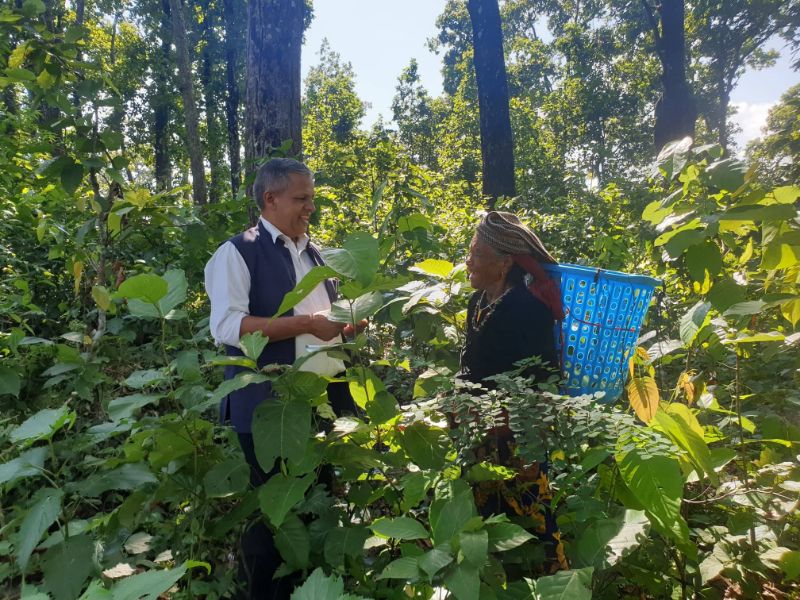
Women collecting leaves for plate making (c) Srijana Baral
Southeast Asia
Smallholders are the backbone of Southeast Asian agriculture, with women comprising around 32% of agricultural labour in the region’s agricultural-exporting countries, in communities with 50% higher poverty rates than cities.
Association of Southeast Asian Nations (ASEAN) policy-makers have recognised the importance of agriculture in meeting the region’s climate change mitigation goals: soils, trees and crops can store significant greenhouse gases, especially in combination with forest protection and restoration. The sector could also contribute significantly to climate resilience, through appropriate local adaptation practices.
Most women are engaged only as agricultural labourers, are seldom landowners, are less educated or literate than men, and carry a heavier load of unpaid care work. As men migrate to cities for work, women increasingly become the heads of households and are vulnerable to climate and economic shocks.
- The opportunity is to foster climate-mainstreaming and gender-mainstreaming in the policies and practices of agriculture value chain actors. More specifically, the Covid-19 pandemic affected the livelihoods of 55 million smallholder farmers. The ASEAN Comprehensive Recovery Framework Implementation Plan provided an opportunity for gender and climate responsive recovery.
- GLOW project ASEAN Green recovery through equity and empowerment (AGREE) works with agribusinesses and social enterprises to mainstream gender and enhance inclusion while contributing to national and regional climate objectives. It works with businesses to pilot-test training for women farmers and cooperatives on enterprise growth, market access, environmental conservation and climate-smart practices. It provides practical advice to policy-makers on achieving NDC targets and women’s empowerment through incentives, public procurement, and financing schemes and policies aligning with NDCs.
Women-led sustainable forest enterprises
Nepal
More than 40% of Nepal’s land area is covered in forest. The Government of Nepal has presented the sustainable management of healthy forests as a key adaptation and mitigation priority in its NDC. The government and local communities also recognise forests as a critical source of economic livelihoods, food and nutritional security, materials for homes, and support for cultural, religious and spiritual life.
Women are heavily involved in forest management. Nepal has strong gender equality provisions in its Constitution and also in its NDC; similarly, regulations mandate the increased representation of women in Community Forest User Groups. However, in reality, women have little decision-making power over natural resources. Indigenous women, Dalits (historically known as ‘untouchables’), the land-poor and landless, women with disabilities, and single and widowed women are notably excluded.
- The opportunity is for management, technology, and markets in forest products to evolve to provide greater economic empowerment and climate-resilient development for women in rural Nepal. However, challenges prevent them from using their knowledge and skills to generate more sustainable futures.
- To overcome those challenges, ForestAction Nepal’s action research project, Economic Empowerment of Women through Forest Solutions, aims to enhance women’s economic status through low-carbon enterprises based on forest resources. The goal is to enable women and marginalised communities to withstand challenges posed by climate change and pandemics such as Covid-19. Indeed, the project has already resulted in empowering women with the skills to launch their own businesses – processing and marketing sustainably-harvested forest products. No fewer than 18 women-led enterprises have been supported to launch and expand their businesses.
- The Co-producing a shock resilient business ecosystem for women-led enterprises in Nepal (CREW) project also worked with women on the sustainable management of the high-value aromatic plant wintergreen (Gaultheria). This forest-growing shrub is the primary source of income for women at one of its sites.
- Both Nepal initiatives have demonstrated how ongoing engagement with Community Forest User Groups can facilitate the emergence of women’s leadership in these local institutions and more inclusive forms of forest governance.
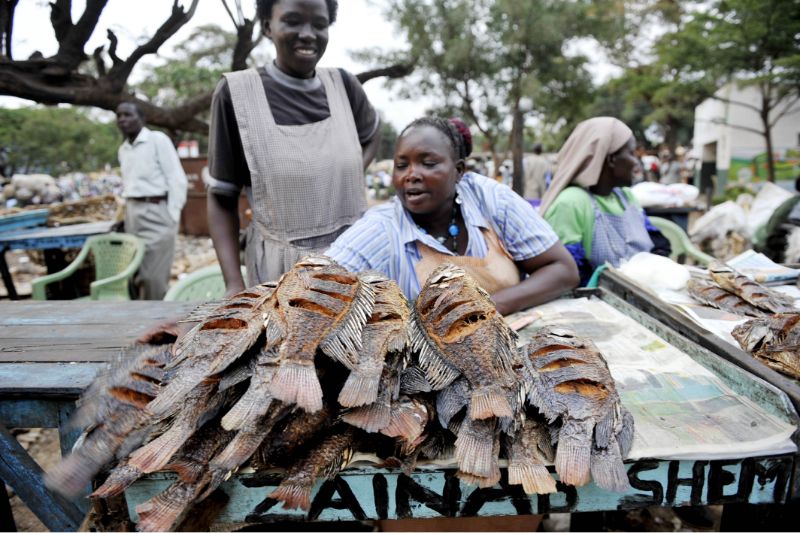
Fish marketing, Kenya (c) ILO
Decent jobs for women in aquaculture
Kenya
Kenya Vision 2030 aims to transform Kenya into “a newly-industrialising, middle-income country providing a high quality of life to all its citizens in a clean and secure environment”. In this context, the Government of Kenya considers the blue economy (covering oceans, coasts and lakes) one of its priority economic sectors. The blue economy is seen as an engine of growth and development, with important contributions to make to food and nutrition security as well as creating employment, generating income, wealth, foreign exchange earnings, and reducing poverty.
But women’s place in the blue economy is not assured. The structural gender inequalities in Kenya’s coastal fisheries communities have led to women’s disproportionately suffering a steep decline in business opportunities, higher losses and diminishing returns. This is because women have limited access to ocean resources, feel insecure at sea, lack the skills and capital to invest in fishing vessels and post-harvest handling facilities, and suffer social pressure and discrimination from the hierarchical power dynamics in their communities.
- The opportunity is for women to have decent jobs cultivating seaweed and raising fish, with the help of new technologies – work that would provide them with secure incomes and safe working environments, while enabling them to provide for themselves and their families.
- GLOW project Aquaculture of seaweeds and fish: Opportunities for blue economic empowerment and Covid-19 resilience in Kenya is demonstrating how integrated multi-trophic aquaculture (IMTA), opportunities for fish farming and seaweed production can support women’s economic empowerment. It is working to build women’s agency 5, resources and institutional structures for productive low-carbon, climate-resilient jobs in Kwale and Kilifi Counties. The project hopes that these pilot experiences can be scaled up to create a more gender-equitable blue economy. Find more information on the project website: https://blueeconomy.acts-net.org/
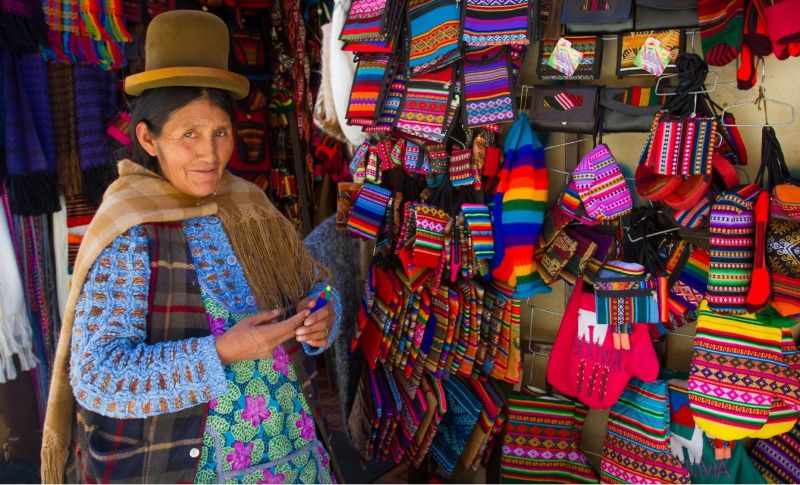
Bolivian Indigenous woman at her craft stall (c) SDSN Bolivia
Women’s empowerment through sustainable tourism
Bolivia
In Bolivia, the structure of the economy has been weighted toward heavily greenhouse gas-emitting sectors, such as mining. Now, an open, national debate is taking place about how different sectors of the economy could be supported to grow in a more ecologically sustainable way and support decent livelihoods equitably for both women and men.
Eco-tourism is in the spotlight. Women are already well represented in the tourism and hospitality sectors. Visitors seek out handicrafts and ecologically sustainable activities, such as hiking and biking, where women already excel as producers and guides.
- The opportunity is to grow the eco-tourism sector in ways that empower both women and men economically. Eco-tourism could generate foreign exchange revenues, while giving women and men decent work and securing a pivot from the male-dominated, environmentally harmful extractive activities on which Bolivia has relied in the past. The country could develop the sector in ways that protect and enhance its rich natural and cultural assets, especially if it focuses on high-value tourism.
- GLOW project Tourism as an engine of gender-inclusive and sustainable development in Bolivia aims to influence the country’s development pathway. It has created a new institution, the Sustainable Tourism Observatory Orbita [in Spanish], to galvanise thinking, training and innovation to expand gender-responsive eco-tourism.
- The project’s findings have resonated so strongly with the Government of Bolivia that the team is now working with the Office of the Vice Presidency to draft a Supreme Decree setting out how tourism has the potential to become the main export product of Bolivia in just 5- 6 years, generating much-needed foreign currency and hundreds of thousands of high-quality jobs, especially for women and young people, with minimal environmental harm.
Women’s empowerment in circular economies
East Africa
Women outnumber men in Africa’s agricultural workforce, yet women have lower rates of agricultural productivity. It’s not because they are less efficient farmers, but because they do not have equitable access to agricultural inputs, land rights and markets for their products. These challenges only deepened during the COVID-19 pandemic.
The FAO suggests that agricultural productivity in sub-Saharan Africa would rise by 20% if women had equal access to inputs and land. Transformations in women’s access to these productive assets would increase productivity and empower women as farmers, employees, consumers and partners.
The answer is not necessarily to spend more money on external agricultural inputs for diminishing returns: many emergent regenerative 6 and circular economy 7 technologies and techniques provide climate-smart solutions with rapid returns on investment and/or money-saving benefits. They can also offer women economic opportunities along value chains, opportunities that require relatively small land footprints. They include the growing use of black soldier fly farming in sub-Saharan Africa: a fly that eats through municipal organic waste to generate high-quality compost and larvae that provide a protein-rich livestock feed.
Another emergent technology is aquaponics, a sustainable farming technique that combines aquaculture (fish farming) with hydroponics (soilless plant cultivation). Its low-input system is low-carbon and climate-resilient. It has immense potential to transform women’s lives in Africa, advancing their economic empowerment and food security, and the environmental sustainability of their practices.
- The opportunity is to introduce more business leaders to climate-smart and ‘gender lens investing’ perspectives, demonstrating the combined potency of climate and gender mainstreaming to deliver robust and sustainable financial results. The opportunity also lies in introducing regenerative and circular (bio)economy technologies and techniques that can reduce vulnerabilities to climate change impacts such as unpredictable rainfall and boost the agricultural yields of women workers and entrepreneurs.
- The GLOW project Reorienting the private sector to enable climate-smart agricultural solutions to address gender inequalities has worked intensively in the East African countries of Kenya, Tanzania, Uganda and Rwanda. The project focuses on a range of small and medium enterprises using regenerative agriculture and circular economy technologies and practices. Together, they demonstrate the business case for gender and climate mainstreaming, identifying the specific types of support women workers and entrepreneurs want, and defining how broader government policies and business standards could enable low-carbon, gender-equitable enterprises to flourish.
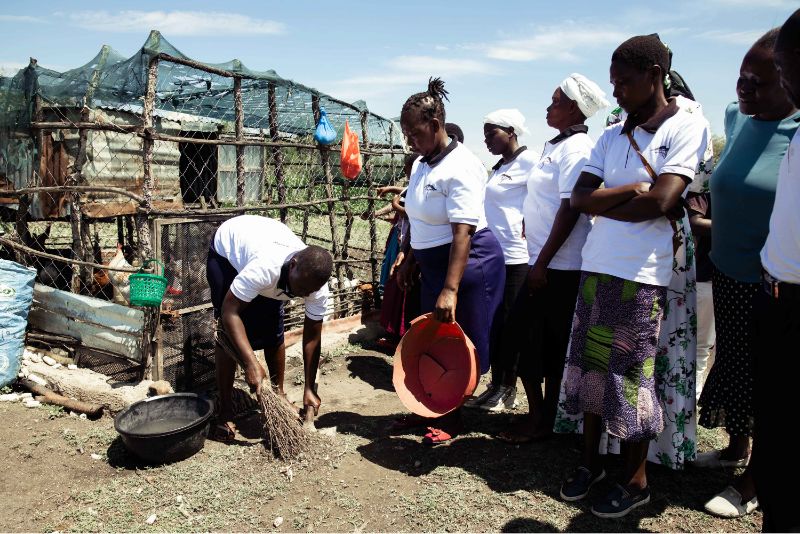
Collecting chicken waste for compost in a biocircular economy enterprise (c) CIFOR-ICRAF
Footnotes
- The definition of ‘decent work’ by the International Labour Organization is: productive and delivers a fair income, security in the workplace and social protection. Click here for a full definition
- Bolivia’s Constitution (2009) Article 46.
- Bolivia’s Constitution (2009) Article 8.
- The Food and Agriculture Organization of the United Nations (FAO) classifies own-account and contributing family labour as ‘vulnerable work’.
- Agency: the ability to take action or choose which action to take. Source: Cambridge English Dictionary.
- “Regenerative agriculture is a way of farming that focuses on soil health. When soil is healthy, it produces more food and nutrition, stores more carbon and increases biodiversity – the variety of species.” Source: World Economic Forum
- “The circular economy aims to “reduce the use of virgin raw materials and waste production, to improve the circularity of the raw materials used, and to extend their lifetime, completing the economic and ecological cycles of resource flows.” Source: Paes et al. (2019).
